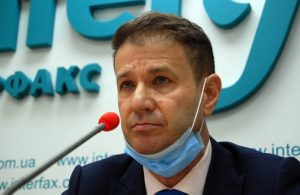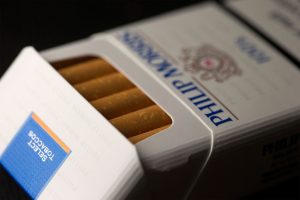
PrJSC Philip Morris Ukraine, one of the largest tobacco companies in Ukraine, in 2020 increased its net profit by 5% compared to 2019, to UAH 2.73 billion.
According to the company’s statement in the information disclosure system of the National Securities and Stock Market Commission, its assets for the year increased by 18%, to UAH 11.51 billion, and retained earnings by 55.5%, to UAH 7.79 billion.
Total debtor indebtedness over the year increased by 28.4%, to UAH 8.63 billion.
It is also indicated that at an annual meeting of shareholders on April 27, it is planned to obtain approval for the company to carry out significant transactions with an aggregate value of up to UAH 40 billion, which until April 30, 2022 can be used by the company to conduct business. In addition, during the meeting, it is planned to approve the main directions of the company’s activities, which include the further increase in production capacity and the expansion of the company’s product range.
Philip Morris International, which includes PrJSC Philip Morris Ukraine, is one of the world’s largest manufacturers of tobacco products. It produces cigarettes in more than 50 factories and sells them in 180 countries.
The company has been operating in Ukraine for over 20 years, owns a factory in Kharkiv region, and employs over 1,300 people.
The company reduced the shipment of cigarettes in Ukraine in 2020 by 4.3% compared to 2019 due to a general market decline, which was partially offset by an increase in the market share of heated tobacco products.

Philip Morris Ukraine this year predicts a decline in the legal market of heated tobacco products by 3.1 times compared to last year, to 1.5 billion pieces, due to an increase in the excise tax on these products from January 2021 by 320%, Financial Director of Philip Morris Ukraine Maksym Barabash said at a press conference in Interfax-Ukraine.
“A one-time increase in excise taxes by 320% from January 1 requires a price increase of approximately UAH 29 (for a pack of heated tobacco products), not including the price increase due to inflation and the devaluation of the hryvnia. If we transfer this price increase to consumers, the price will increase to 80-90,” he explained.
CEO of the company Kostas Salvaras said that Philip Morris Ukraine supports amendments to law No. 4278, proposing an increase in the excise tax on heated tobacco products by 200% with its further growth by 30% in 2022-2025 instead of a one-time increase by 320%. These changes in the form of amendment No. 55 were adopted in February by the parliamentary committee on finance, taxation and customs policy.
According to the calculations of Philip Morris Ukraine, a smoother increase in the excise tax will help protect the legal market, the capacity of which, if this amendment is adopted, will grow this year by 6.3% compared to 2020, to 5 billion units.
The company also expects that in the event of a gradual increase in tax, the growth of revenues to the state budget in 2021 will not be lower than UAH 4.8 billion planned by the Ministry of Finance, and UAH 6.5-7.5 billion in 2022.
Barabash clarified that a one-time increase in excise tax by 320% will lead to a 1.5-fold increase in prices for the products, and will make illegal import of heated tobacco products four times more profitable than smuggling regular cigarettes. The company’s financial director estimated the profit from the illegal import of one heated tobacco product box at $ 500-800.
In addition, according to him, the equalization of the excise tax rate for heated tobacco products and ordinary cigarettes to 320% will entail a return of users of devices for heating tobacco to cheaper and more harmful nicotine-containing products – cigarettes. He noted that this decision contradicts European practice, since on average in the EU countries the excise tax on heated tobacco products is 72% lower than the excise tax on cigarettes, while in Ukraine this figure is 28%.
Barabash clarified that a sharp increase in the excise tax on this product would jeopardize UAH 4.2 billion already invested in the development of the Ukrainian infrastructure of the IQOS brand, which employs more than 2,000 people. It will also make it impossible to localize the production of heated tobacco products in Ukraine, which could reduce the price of this product.
As reported, Philip Morris International is one of the world’s largest tobacco manufacturers. It produces cigarettes in more than 50 factories and sells them in 180 countries.
The company has been operating in Ukraine for over 20 years. In Ukraine, Philip Morris owns a factory in Kharkiv region, the company employs over 1,300 people.
In 2020, the company reduced the shipment of cigarettes in Ukraine by 4.3% compared to 2019 due to a general market decline, which was partially offset by an increase in the market share of heated tobacco products.

Philip Morris Ukraine, a large tobacco manufacturer, will soon file a motion with the International Center for Settlement of Investment Disputes (ICSID) in Washington in response to the decision of the Antimonopoly Committee of Ukraine (AMCU) on a UAH 1.2 billion fine.
“Several years ago, the Antimonopoly Committee issued permits for the concentration of a company that practically ‘swallowed’ all distribution in the tobacco market. We actually had no choice with whom to work with. What happened next? Over time, the same Antimonopoly Committee declared that we, the producers, were to blame for ‘establishing a monopoly,’ and issued a huge fine to the producers,” said the company’s CEO Kostas Salvaras in an exclusive interview with Interfax-Ukraine.
According to him, back in February, the company filed a notification to the Ministry of Justice about the violation by the state of Ukraine of a number of obligations under the investment protection agreements. “The state has expired six months for the peaceful settlement of the dispute, and we have the right to initiate arbitration proceedings directly,” Salvaras said.
“At the moment, we have already prepared an application to the International Center for the Settlement of Investment Disputes in Washington. We will submit an application shortly. We believe that we have a high chance of winning. When we win, we will be able to demand from the state not only return the fine paid by us, but also to compensate for our costs for lawyers,” said the director general of Philip Morris Ukraine.
As reported, the AMCU imposed a fine of UAH 6.5 billion for anti-competitive concerted actions on four cigarette producers, including a UAH 3.4 billion fine on the distributor Tedis Ukraine.
Later, Philip Morris Ukraine paid a fine to the AMCU for a total amount of more than UAH 1.18 billion in order to avoid the accrual of penalties.
PJSC Philip Morris Ukraine jointly with LLC Philip Morris Sales and Distribution are affiliated companies of Philip Morris International (PMI), one of the world’s largest manufacturers of tobacco products.
The company has been operating in Ukraine for over 20 years. It produces products at a factory in Kharkiv region.
In 2016, Ukraine became the seventh market in which Philip Morris launched IQOS, based on tobacco heating technology. Both affiliated companies employ over 1,300 people.

PrJSC Philip Morris Ukraine, a large tobacco producer, proposes to replace a 320% tax increase on tobacco products for electric heating, which should come into force on January 1, 2021, with an annual increase of 50% during 2022-2025 or 200% in 2021 and 20% in subsequent years.
According to the published letter of Philip Morris Ukraine CEO Konstantinos Salvaras to the president of Ukraine, a gradual increase in the excise tax on tobacco products for electric heating by 50% per year or by 200% in 2021 and by 20% in subsequent years will save the market from a total transition to the shadows and bring more revenues to the state budget than a sharp increase in the excise tax rate by 320%.
“We urge the government to move away from the practice of unpredictable and unstable tax policy, which affects both the attitude of investors and the economy of the country. Tax increases should be gradual, not fourfold,” the Philip Morris letter says.
The company reported that the government and academia share the vision of a gradual increase in the tax rate. Thus, the Ministry of Economic Development, Trade and Agriculture supports the idea of increasing the rate on tobacco products for electric heating by 50% from January 1, 2021 and by 50% during 2022-2025, and a study conducted by the Institute for Economics and Forecasting of the National Academy of Sciences of Ukraine shows that a gradual increase in the excise tax on tobacco products for electric heating will provide additional UAH 18.7 million of revenues to the state budget compared to a sharp increase in the tax rate.
According to Philip Morris’ estimates, a sharp increase in excise taxes will lead to the loss of potential and real investments, state budget revenues, an increase in the level of smuggling, and a conflict with EU legislation.

Philip Morris International Inc. (PMI) in January-September 2020 cut cigarette shipment volume by 4.8%, mainly due to the lower total market, partly offset by a higher market share, driven by heated tobacco units.
According to a quarterly report published by PMI, the total market in Ukraine was down by 9.7%, mainly reflecting the impact of excise tax-driven price increases, as well as reduced adult smoker average daily consumption, notably in the second quarter of 2020, due to lockdown measures.
The company said that in Q3 2020 the total market in Ukraine fell by 7.4%.

The Antimonopoly Committee of Ukraine (AMC) continues to consider the case on government aid to PrJSC Philip Morris Ukraine, opened on January 3, 2020 due to an appeal from one of its competitors.
According to the information released on the committee’s website, in autumn of 2019, the committee received an application from one of the tobacco producers to verify information on illegal government aid due to the cancellation of the tax obligations previously determined for Philip Morris Ukraine by the State Fiscal Service.
The cancellation of tax obligations is one of the forms of government aid due to the law on government aid to business entities.
“Having received the application, the committee sent a request to the State Fiscal Service in accordance with the law. However, in response, the service provided explanations on the facts of tax obligations cancellation, but did not submit the necessary statement, which is a direct basis for initiating a government aid case,” the committee said.
Currently, the committee is analyzing the information provided by the parties of the case and other persons to make a decision. The committee also drew attention to the fact that the initiation of a government aid case is not the final conclusion about its admissibility or inadmissibility.
Philip Morris International is one of the world’s largest manufacturers of tobacco products. It produces cigarettes in more than 50 factories, sells them in 180 countries.
In Ukraine, the company has been operating for more than 20 years. It manufactures products in a factory in Kharkiv region.